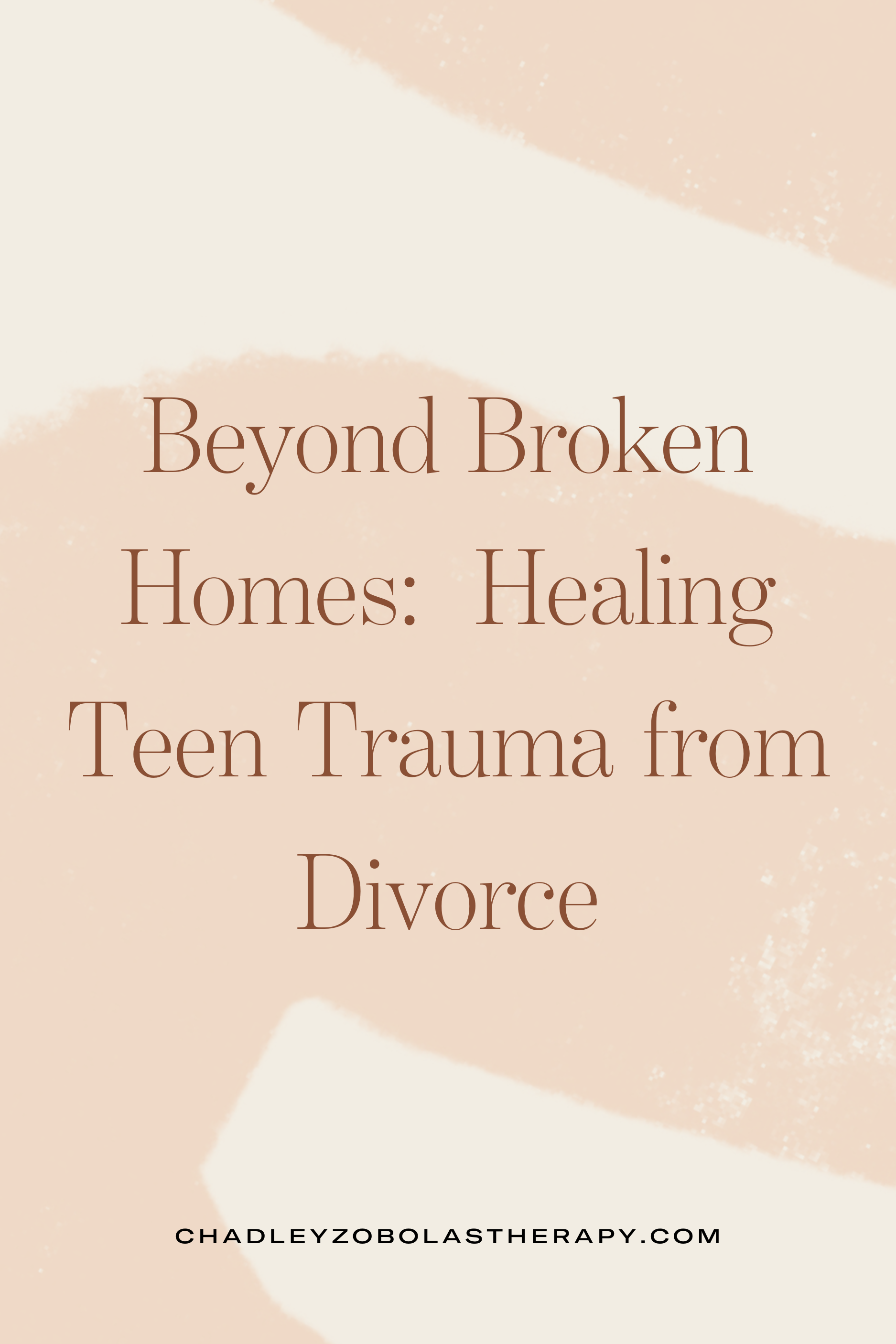Beyond Broken Homes: Healing Teen Trauma from Divorce
By a teen counselor and trauma therapist in Denver, CO
Have you ever heard the statement, "As a child of divorce?" This poignant phrase encapsulates the impact that a fractured relationship can have on a young person, leaving a mark on their journey and process of building their own secure relationships. Divorce is a painful and challenging experience for all family members involved, but it can profoundly impact teenagers in numerous ways. The emotional turmoil, uncertainty, and changes accompanying divorce can leave lasting impacts on the hearts and minds of young people.
Statistics reveal the prevalence of divorce, with 35-50% of first-time marriages in the United States ending in this outcome. This may sound grim, but these numbers highlight the widespread impact that divorce has on the lives of countless people. However, despite the statistics, it is crucial to remember that with proper support, healing from divorce trauma is possible.
Additionally, it’s often the case that divorce, although traumatic for all involved, is still the healthiest and best next step for everyone in the family. This is an important reality to keep at the forefront of all discussion around divorce and one that we hope to highlight in this blog.
As we delve into this topic of supporting teens through the trauma caused by divorce, our Denver teen therapists hope to provide you – both teens and their parents– with helpful tips and insight to support healing and growth after divorce.
Explore one of our other blogs to learn more about how our practice structures teen therapy in Denver.
Understanding Teen Trauma from Divorce
Divorce can be overwhelming for teenagers, disrupting their sense of stability and security. The impact of divorce on teens varies and often manifests in various emotional and behavioral changes. Because of this, teens may find themselves experiencing feelings of sadness, anger, guilt, and confusion. They may struggle academically, withdraw from social activities, or exhibit rebellious behavior.
Although painful for parents, it’s also common for teenagers to experience a sense of detachment from one or both parents during, and for a period after, a divorce. It’s important to show up emotionally for your teen during this time in a way that honors where they’re at and the boundaries they’ve set for themselves, while also keeping an eye out for severe signs of withdrawal and isolation.
Supporting Healthy Attachment for Your Teen
While embracing independence is an important part of every teen’s development, this process can sometimes be accelerated or heightened by being a child of divorce. If you start to notice significant emotional and/or social withdrawal in your teen, such as pulling away from friends, sports, or other previously loved activities, it’s important not to write it off.
As young people, our attachment, or systems for building and maintaining healthy relationships with others, are in peak development. A relational trauma like divorce can murky the waters and color a teen’s attachment moving forward. Not only can this harm a teen’s relationship with themselves and others in the present moment, it can also impact a teen’s ability to connect healthfully with others throughout adulthood.
While these attachment impacts look differently for everyone, here are a few examples of the impact of divorce on attachment. Teens who experiences their parents’ divorce may hesitate to commit to partners in the future, fearing the pain of losing love as their parents experienced. They may also experience a significant fear of abandonment that can destabilize and undermine their sense of security in a safe, healthy relationship as a result of the divorce trauma stored in their nervous systems.
While all of this sounds very grim, it’s actually very possible for your teen to come out on the other side with healthy skills, a more grounded nervous system, and a positive roadmap for building relationships in the future. This can only happen with intentionality and the right support from parents, though. The best thing you can do for your teen, aside from providing emotional support at home, is getting them outside supports. This can look like therapy, teen support groups, family therapy, new routines at home, extra school supports, etc. EMDR therapy is one way to support teens experiencing divorce trauma that our team of teen therapists is trained in. Let’s elaborate more on EMDR therapy below.
How Can EMDR Therapy Support in Healing Teen Trauma from Divorce?
What is EDMR you might be asking? We wrote an entire article about the benefits of EMDR and how EMDR can help us heal from trauma. Additionally, here is a quick, non-exhaustive breakdown of how EMDR can help.
1) Coping skills and grounding techniques
EMDR therapy begins by working on coping skills, meditation, mindfulness, and grounding techniques. These tools help trauma survivors feel safe and grounded in the present, laying the foundation for the trauma therapy process.
2) Addressing stored trauma in the body
EMDR focuses on identifying and processing past traumatic experiences that are still impacting you. EMDR therapy goes beyond cognitive understanding of your trauma and its lingering effects. Instead, it works directly with the nervous system to promote regulation and rewire traumatized neural networks in your brain.
3) Bilateral stimulation (BLS)
EMDR uses bilateral stimulation, which involves stimulating one side of your brain and the other, typically through eye movements, sounds, or physical sensations. This technique is used while processing past traumatic events, including images, memories, body sensations, thoughts, and emotions. BLS helps the brain reprocess and store these memories in a way that is no longer distressing to your nervous system.
4) Healing the whole person
As traumatic experiences become less charged, our nervous system becomes more regulated and our neural networks begin to heal. EMDR is a holistic approach that focuses on the entire human, leading to a comprehensive healing process.
Image of an EMDR therapy session using bilateral stimulation (BLS)
Next Steps if Teen Counseling in Denver, CO Sounds Right for Your Family
The impact of divorce on teenagers can be substantial, impacting their emotional wellbeing and future relationships. However, it is important to remember that your teen does not have to face this alone. With professional support from a caring and supportive therapist, parents and teens can embark on this path toward healing together.
Our therapists at CZ Therapy Group understand the complexities of teen trauma from divorce and are committed to supporting families on this path step by step.
Reach out today for a free consultation to learn more about what we offer and connect with a Denver teen counselor on our team!




